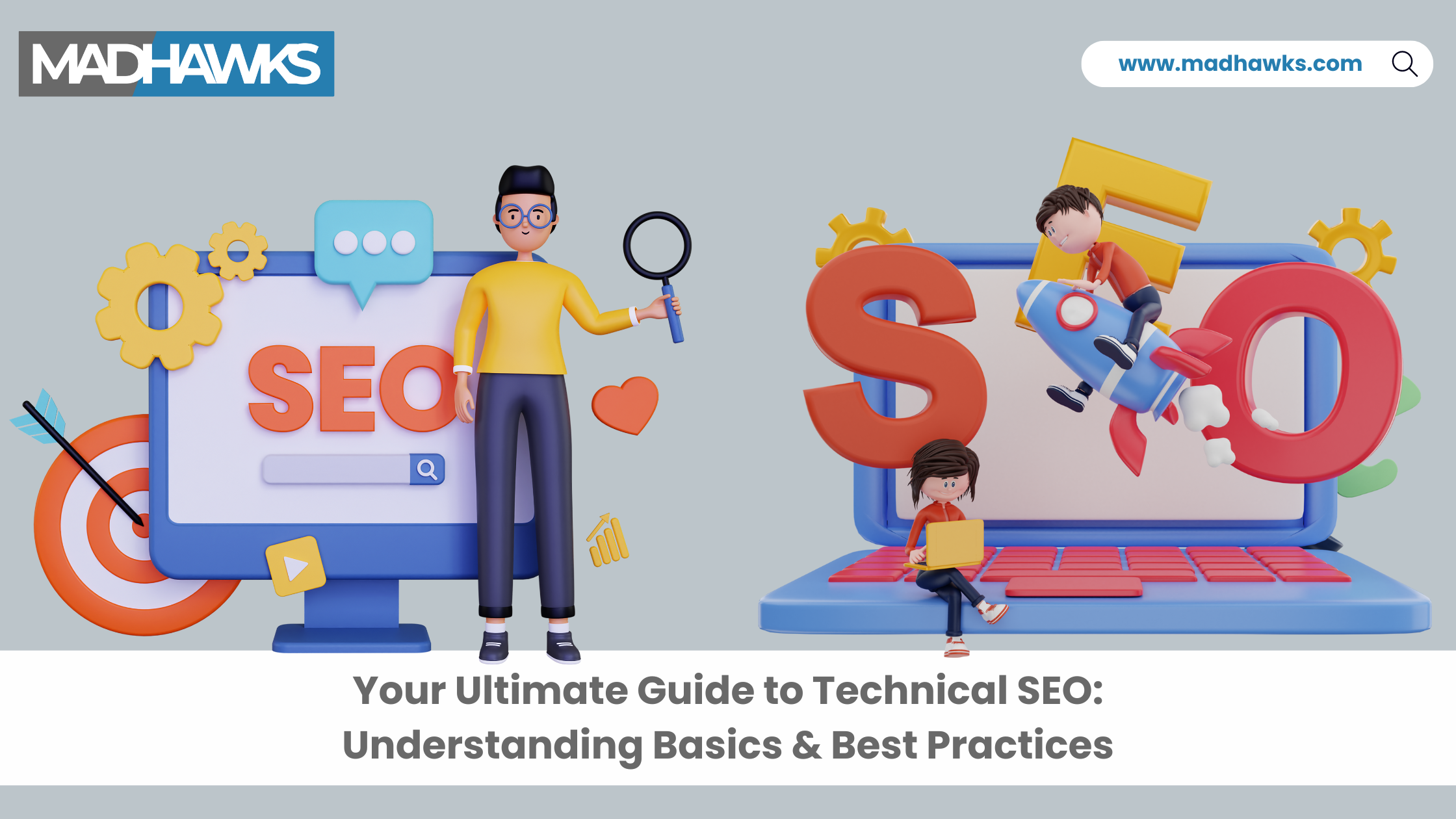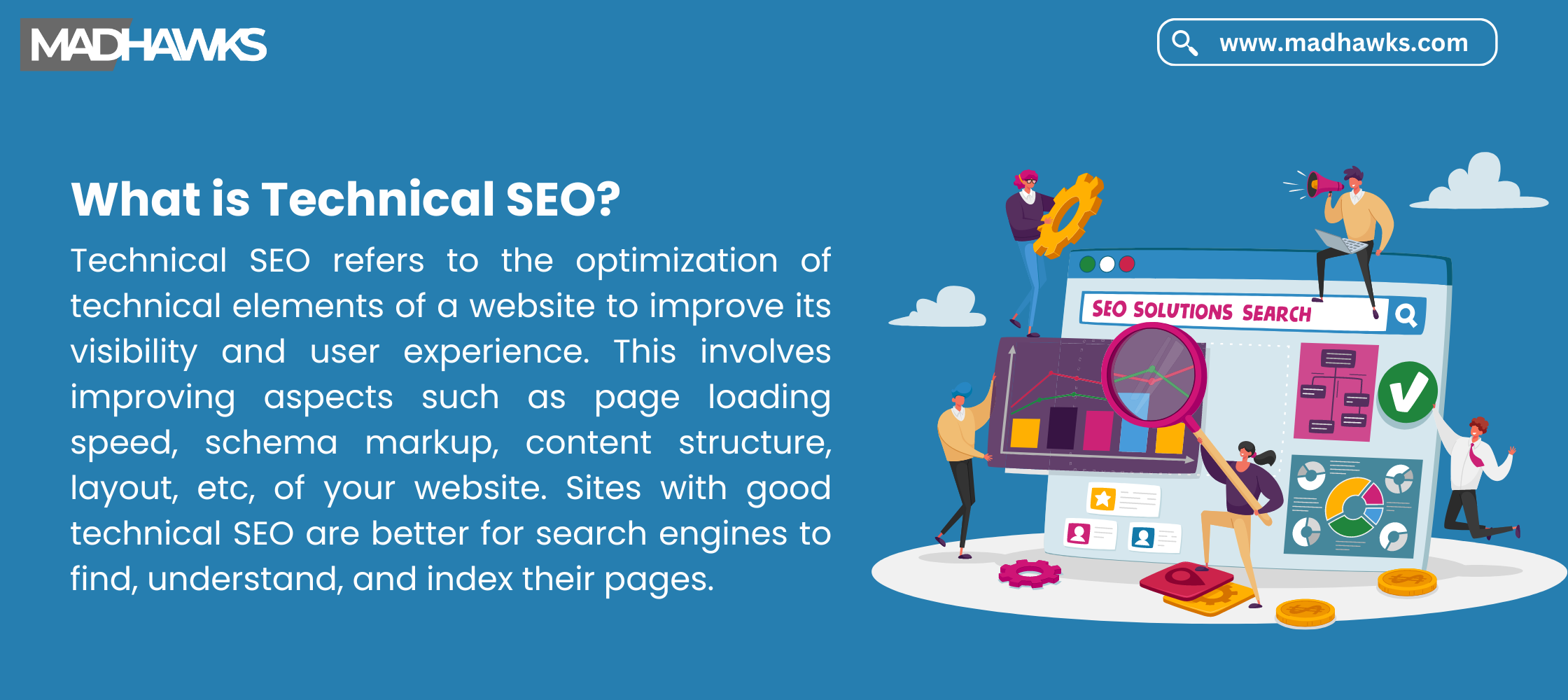Your Ultimate Guide to Technical SEO: Understanding Basics & Best Practices
Posted By Gaurav | 30-Jul-2024 | Search Engine Optimization
Technical SEO is an important aspect to consider when it comes to boosting website traffic and SEO performance. It is the concept of improving a website’s technical elements like page speed, ease of navigation, etc, so that search engines can easily find, crawl, and index the web pages.
Although content and off-page activities like link building may have a higher impact on a site’s SEO performance, its technical optimization is also important for higher ranking and better user experience. Let us understand in detail what technical SEO is, why it matters, and how you can optimize the technical aspects of your site:
What is Technical SEO?

Technical SEO refers to the optimization of technical elements of a website to improve its visibility and user experience. This involves improving aspects such as page loading speed, schema markup, content structure, layout, etc, of your website. Sites with good technical SEO are better for search engines to find, understand, and index their pages.
It helps search engines understand the context of your website and rank it properly. The purpose of technical SEO is not just to improve visibility in the eyes of search engines, but also to improve user experience. Technical aspects like page speed, mobile-friendliness, etc, play a crucial role in a website’s user experience.
Also Read: Your Ultimate SEO Guide in 2024: From Basics to Advanced ...
Why is Technical SEO Important?
Technical SEO helps search engines better understand the content of your website and rank it for relevant search queries. This further improves the visibility of your site on search engines and its traffic. The following are some significant reasons why technical SEO matters:
- Websites that are technically optimized are easier for search engines to understand, crawl, and index. Better indexability refers to higher visibility of your website on search engines, which is SEO agency india ultimate goal.
- Technically optimized websites have better loading speeds, which result in lower bounce rates. As your website loads quickly, it improves user experience and users are more likely to stay longer on your web page. This further impacts the site’s ranking positively.
- Sites with faster loading times and easy navigation offer better user experience, which increases user retention rates.
- Mobile-friendly sites are more accessible and easy to use across multiple devices, which again improves its visibility and traffic.
Understanding Best Practices of Technical Optimization of Your Website
Here are some technical SEO basics and best practices that you can use for the technical optimization of your website:
1. Make Your Site Mobile-Friendly
It is important to make your website mobile-friendly in order to make it accessible for maximum potential users. As per a recent update by Google, sites that are not accessible on mobile phones will no longer be indexed and ranked by Google. Therefore, ensuring mobile accessibility of sites is not a choice but a necessity now. Make sure that you use a mobile-responsive website design that is accessible across multiple devices to provide users with a seamless experience.
2. Incorporate a Simple Website Structure
The simpler your website is to use and navigate through, the more users are likely to stay on it for a longer time. Make sure that you go for a simple website structure where all the options are easy to navigate through. Use a breadcrumb schema markup to avoid negative user experience, so that users can easily know their location on a particular website and go back to any previous page. Also, structure the content properly using headings, subheadings, and bullet points when required.
3. Use Descriptive URLs
The URLs of web pages should be relevant to the page’s content and must be descriptive. It should contain the target keyword so that search engines can rank your web pages for relevant search queries. Instead of publishing web pages or articles with random URLs, make sure to edit and optimize the URL before publishing.
4. Write Alt Text for Images
The alt text of images helps search engines understand the context of the image. Also, this text description is shown even when the images don’t load properly. So, use relevant alt texts that include the target keyword so that search engines can understand and display these images for relevant search queries. Alt texts are also useful for those with visual disabilities as this text helps them understand that there is an image with a particular alt text in between the content when they use text-to-speech conversion.
5. Use robots.txt
You can use a robots.txt file in case you have web pages that you don’t want to be crawled and indexed by search engines. There may be pages that are not relevant for search engines. You can restrict these pages from getting crawled. By doing this, you can prevent your private information from being visible on search engines and allow search engines to pay attention to important pages that need to be crawled.
6. Organize Pages in a Logical Hierarchy
Make sure that your website has an SEO-friendly architecture. An SEO-friendly architecture has web pages organized in a proper hierarchical manner. Create category pages and sub-category pages if required. The home page should link to the category pages and the category pages then should further link to the sub-category pages. Also, ensure that every page is internally linked to some other page. Orphan pages are difficult to find and index for search engines. Therefore, it is advised to have a proper internal linking structure.
7. Use XML Sitemaps
XML sitemaps contain information about all the web pages of your site, such as when the page was last updated, how important it is for your site’s performance, and more. With XML sitemaps, search engines can better understand the structure of your site. This further helps in better crawlability and indexability of your web pages.
8. Use HTTP/2
The HTTP/2, which is a more advanced version of HTTP. HTTP/2 is faster and more efficient compared to the previous versions of HTTP like HTTP 1.1. By incorporating this new version into your website, you can improve your site’s loading speed and performance, which has a direct impact on its ranking on search engines.
9. Use CDN (Content Delivery Network)
A CDN (Content Delivery Network) is used by website owners to get their content to reach users based on their location. If you create location-specific content targeted at users from different locations across the world, using a CDN would be highly effective in serving the real purpose of your website content. By using a CDN, you can improve the speed and performance of your site for users who are located far away from your server.
10. Optimize Images Properly
The images should be properly resized and optimized for your website’s layout. For the overall loading speed of a page, it is important to optimize image loading speed. You can use techniques like lazy loading to reduce delay in page loading. The images should be in the right format, properly named, and optimized for search engines. Click here to read more about image SEO optimization.
Summing Up
Technical SEO optimization cannot be overlooked when you genuinely want to make the most out of your SEO efforts. In order to make on-page and off-page SEO work properly, it is important to pay attention to the technical aspects of your site. You must ensure that your website has a simple and SEO-friendly architecture, a good loading speed, mobile-friendliness, and other important factors mentioned above. In case you need any assistance with technical SEO or the overall SEO strategy of your website, you can get in touch with our experts!
Frequently Asked Questions
1. Why is Technical SEO important for my website?
Ans. Technical SEO plays an important role in user experience as well as improving your site’s visibility on search engines. By optimizing the technical elements of your website, you can help search engines better understand the content and display it for relevant search queries.
2. How can I improve my website's crawlability?
Ans. You can follow these tips to improve your site’s crawlability:
- Use a proper internal linking structure
- Build an SEO-friendly website architecture
- Improve page loading speed
- Use an XML sitemap
- Improve content quality
3. How do HTTPS and SSL certificates impact SEO?
Ans. Websites with HTTPS encryption are considered trusted and safe by search engines, which further impacts the decision of search engines when ranking web pages.
4. How can I optimize my site for better indexation?
Ans. For better indexation of your web pages, you can follow these tips:
- Eliminate pages that need not be indexed using a robots.txt file
- Merge duplicate pages
- Optimize your sitemap
- Improve your site’s structure
- Use proper internal linking
5. What is the significance of URL structure in Technical SEO?
Ans. The structure of URLs helps search engines understand the context and hierarchy of your web pages. Therefore, it becomes important to edit URLs to make them descriptive and include target keywords before publishing the pages.

